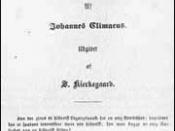Willed Faith and Belief An essay on Kierkegaard 1. Introduction Can we will to believe what we choose? Are there times when we should at least try to believe in something? If it were easy to manipulate our own beliefs, low self-esteem would vanish, the divorce rate would decline, and over-consumption would disappear with the reminder: "I already have enough stuff." Yet there is something suspect about willed beliefs. Perhaps it is not ethically responsible to change beliefs without regard for the truth of the matter.1 And the epistemological coherence of the notion is questionable. Perhaps belief states are just not the kind of things that are under the influence of our will - analogous to the fact that we cannot decide to perceive blueness when looking at a red apple.
This is an issue that has attracted some interest in the course of the history of thought. In this paper I will be looking into the views of a contemporary author who sees the relationship of willing to belief as an issue recurring thoughout the history of philosophy.
In his book Religious Belief and the Will2, Louis Pojman identifies Soren Kierkegaard as a direct prescriptive volitionalist, i.e. a thinker who holds that beliefs can and ought to be (at least in some circumstances) directly willed.
C. Stephen Evans, in "Does Kierkegaard Think Beliefs Can Be Directly Willed?"3 responds to Pojman's position, arguing that the attribution of direct volitionalism to Kierkegaard is too strong a claim. Evans does admit Kierkegaard as an indirect volitionalist, i.e. as holding that we can bring about belief states indirectly, as consequences of other actions that are themselves directly willed. (An example might be my taking up a winter sport, in order to produce a belief that winter is an enjoyable season.) Additional articles4 have...


